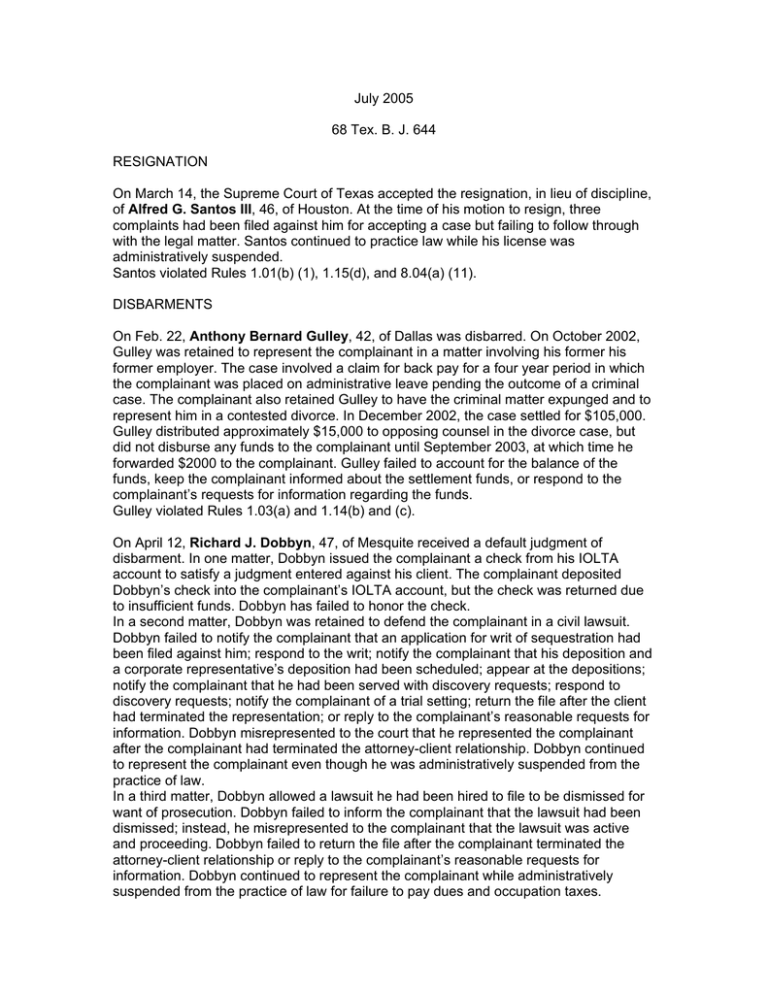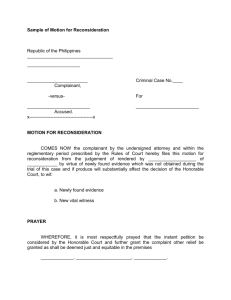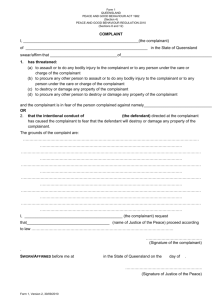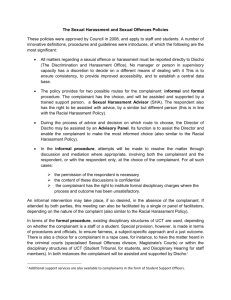July 2005 68 Tex. B. J. 644 RESIGNATION
advertisement

July 2005 68 Tex. B. J. 644 RESIGNATION On March 14, the Supreme Court of Texas accepted the resignation, in lieu of discipline, of Alfred G. Santos III, 46, of Houston. At the time of his motion to resign, three complaints had been filed against him for accepting a case but failing to follow through with the legal matter. Santos continued to practice law while his license was administratively suspended. Santos violated Rules 1.01(b) (1), 1.15(d), and 8.04(a) (11). DISBARMENTS On Feb. 22, Anthony Bernard Gulley, 42, of Dallas was disbarred. On October 2002, Gulley was retained to represent the complainant in a matter involving his former his former employer. The case involved a claim for back pay for a four year period in which the complainant was placed on administrative leave pending the outcome of a criminal case. The complainant also retained Gulley to have the criminal matter expunged and to represent him in a contested divorce. In December 2002, the case settled for $105,000. Gulley distributed approximately $15,000 to opposing counsel in the divorce case, but did not disburse any funds to the complainant until September 2003, at which time he forwarded $2000 to the complainant. Gulley failed to account for the balance of the funds, keep the complainant informed about the settlement funds, or respond to the complainant’s requests for information regarding the funds. Gulley violated Rules 1.03(a) and 1.14(b) and (c). On April 12, Richard J. Dobbyn, 47, of Mesquite received a default judgment of disbarment. In one matter, Dobbyn issued the complainant a check from his IOLTA account to satisfy a judgment entered against his client. The complainant deposited Dobbyn’s check into the complainant’s IOLTA account, but the check was returned due to insufficient funds. Dobbyn has failed to honor the check. In a second matter, Dobbyn was retained to defend the complainant in a civil lawsuit. Dobbyn failed to notify the complainant that an application for writ of sequestration had been filed against him; respond to the writ; notify the complainant that his deposition and a corporate representative’s deposition had been scheduled; appear at the depositions; notify the complainant that he had been served with discovery requests; respond to discovery requests; notify the complainant of a trial setting; return the file after the client had terminated the representation; or reply to the complainant’s reasonable requests for information. Dobbyn misrepresented to the court that he represented the complainant after the complainant had terminated the attorney-client relationship. Dobbyn continued to represent the complainant even though he was administratively suspended from the practice of law. In a third matter, Dobbyn allowed a lawsuit he had been hired to file to be dismissed for want of prosecution. Dobbyn failed to inform the complainant that the lawsuit had been dismissed; instead, he misrepresented to the complainant that the lawsuit was active and proceeding. Dobbyn failed to return the file after the complainant terminated the attorney-client relationship or reply to the complainant’s reasonable requests for information. Dobbyn continued to represent the complainant while administratively suspended from the practice of law for failure to pay dues and occupation taxes. Dobbyn violated Rules 1.01(b) (1) and (b) (2), 1.02(a) (1), 1.03(a) and (b), 1.14(a), 1.15(a) (3) and (d), 3.02, 3.03(a) (1), and 8.04(a) (3), (a) (7), (a) (8), and (a) (11). SUSPENSIONS On March 31, George R. Neely, 55, of Houston received a three-year, partially probated suspension effective April 1, 2005, with the first nine months actively served and the remainder probated. Neely published two advertisements in a subdivision newspaper that was direct-mailed to subdivision residents and held a meeting of subdivision residents for the purpose of soliciting representation of those residents. One advertisement did not disclose the location of Neely’s principal office by city or town and neither advertisement disclosed that Neely was an attorney or that Neely was not certified by the Texas Board of Legal Specialization. Neither advertisement was filed with the State Bar Advertising Review Department. Neely violated Rules 7.02(a) (1) and (a) (2), 7.03(a), 7.04(b) (1), (b) (3), and (j), 7.05(a) (3), (b) (1), (b) (2), 7.07(a), and 7.07(b) (1), (b) (3), and (b) (4). On March 4, Walter A. Ladyman, 51, of Clyde accepted a 30-month, fully probated suspension effective Jan. 1, 2005. On June 20, 2001, Ladyman entered into a contingency fee contract with the complainant to represent her in a personal injury matter arising from an automobile accident. Without the complainant’s knowledge or consent, Ladyman turned her file over to a claims service to negotiate a settlement. The complainant made numerous attempts to contact Ladyman about the status of her case, but was unable to reach him. On Nov. 1, 2002, the complainant contacted the insurance adjuster about her case and was informed that he could not speak to her while she was represented by counsel. On Nov. 8, the insurance adjuster wrote to Ladyman requesting whether Ladyman still represented the complainant or to submit a letter of withdrawal. Ladyman failed to respond to the insurance adjuster’s request. By letter dated Dec. 31, the complainant demanded the return of her file and confirmation of Ladyman’s withdrawal on or before Jan. 15, 2003. Ladyman failed to return the complainant’s file until Jan. 26, two days before the statute of limitations expired. Ladyman failed to inform the complainant of this fact or protect her cause of action by filing suit on her behalf. Ladyman violated Rules 1.01(b) (1), 1.02(b) (2) and 1.03(b). On Jan. 28, St. James Chambers, 52, of Arlington accepted a 15-month, fully probated suspension effective Jan. 1, 2005. Chambers was retained by two different clients to represent their interests in bankruptcy. Chambers failed to diligently pursue each legal matter or respond to his client’s reasonable requests for information. Chambers violated Rules 1.01(b) (1) and (b) (2) and 1.03(b). On March 3, Amy D. Smith, 38, of Normangee received a five-year, fully probated suspension effective March 1, 2005. On Nov. 5, 1999, Smith was retained by the complainant to represent her in an adoption matter. The complainant paid Smith $1500 up front with the agreement that a $1000 balance was due upon completion of the adoption. On Nov. 22, 1999, the baby was born. Smith prepared temporary orders that allowed the complainant to take the baby home from the hospital on Nov. 24. Thereafter, Smith neglected the legal matter and failed to finalize the adoption. She failed to communicate with the complainant regarding the status of the matter or provide the grievance committee with information it requested. Smith violated Rules 1.01(b) (1), 1.03(a) and (b), 8.01(b), and 8.04(a) (8). On May 13, Martin Gomez III, 37, of Corpus Christi accepted a 30-month, partially probated suspension effective May 1, 2005, with the first six months actively served and the remainder probated. Martin was retained in March 2004 to represent the complainant in a criminal case and civil child-custody case, for which he was paid $4000. Gomez failed to appear in court on behalf of the complainant or keep him reasonably informed about the status of the cases. Gomez failed to return the complainant’s file upon request or return unearned fees. Gomez violated Rules 1.01(b) (1) and (b) (2), 1.03(a) and (b), and 1.15(d). On April 13, William Dean Sheetz, 54, of Arlington received a 165-day, partially probated suspension effective April 18, 2005, with the first 30 days actively served and the remainder probated. On October 2001, Sheetz hired someone who had submitted a motion to resign, in lieu of discipline, as a Texas attorney on Aug. 31, 2001. The Supreme Court of Texas accepted the motion on Sept. 19, 2001. On Oct. 12, she was granted signatory authority on Sheetz’s IOLTA checking account. Sheetz allowed her to disburse checks from his IOLTA account to both himself and a company in which he had an ownership interest. At the time the employee wrote the checks, the company was a defunct corporation. On three separate dates, checks were issued from Sheetz’s IOLTA account that were returned due to insufficient funds. Sheetz violated Rules 1.14 (a) and 5.03(a). On May 17, Howard Willis Gaddis, Jr., 51, of San Antonio accepted a two-year, fully probated suspension effective May 1, 2005. Gaddis was retained to pursue claims against a contractor for improperly installing flooring in the complainant’s home. Gaddis was paid $1500 to file suit against the contractor. Gaddis failed to keep his clients informed about the status of the case or return their phone calls or other communication. Gaddis moved his office without informing the clients of his new address. He delayed filing a lawsuit on behalf of the clients until July 23, 2003, and did not reasonably pursue the case once it was filed. Gaddis failed to return the client’s complete file timely or unearned fees. Gaddis continued to represent the clients while he was administratively suspended from the practice of law. Gaddis violated Rules 1.01(a), (b) (1), and (b) (2), 1.03(a) and (b), 1.15(d), and 8.04(a) (3) and (a) (11). On Dec. 15, 2004, L. Mark Steinberg, 51, of San Antonio received a five-year, active suspension effective Dec. 15, 2004. Steinberg knowingly made a false statement of material fact and failed to correct a misapprehension arising from a reinstatement. He engaged in conduct involving dishonesty, fraud, deceit, or misrepresentation. Steinberg violated Rules 8.01 and 8.04(a) (3). On April 6, Charles Michael Brinkley, 52, of Fort Worth received a five-year, partially probated suspension effective April 1, 2005, with the first three months actively served and the remainder probated. On Aug. 22, 2002, the bankruptcy court appointed Brinkley as special counsel for a Chapter 11 debtor in an adversary proceeding involving the debtor’s bank. Brinkley failed to subsequently respond to the bank’s discovery requests, appear at a hearing, or file a response to the bank’s motion for summary judgment. Brinkley failed to accurately and adequately inform both the debtor and general counsel in the bankruptcy matter about the status of the adversary proceeding. The bankruptcy court ultimately dismissed the adversary proceeding for want of prosecution, after which the debtor sought to have the proceeding reinstated. As a condition of reinstatement, the court ordered Brinkley to return to the debtor any fees the debtor previously paid Brinkley for legal representation and suggested that Brinkley pay certain other fees. He failed to comply with the court’s order. Brinkley violated Rules 1.01(b), 1.03(a) and (b), and 3.04(d). PUBLIC REPRIMANDS On March 22, Meridel S. Solbrig, 62, of Fredericksburg received a public reprimand. Solbrig was retained in April 2002 to represent the petitioner in a divorce case. On Nov. 30, 2003, Solbrig received notice from the district clerk that the divorce case had been dismissed for want of prosecution. Further notice of the dismissal was received on Jan. 27, 2004. Solbrig failed to reinstate the case or otherwise protect her client’s interests. Solbrig failed to notify her client when Solbrig received the written notice of dismissal. As a result of Solbrig’s conduct, the complainant had to re-file her divorce case. Solbrig violated Rules 1.01(b) (1) and (b) (2) and 1.03(a). On May 19, George J. Mallios, 56, of Austin accepted a public reprimand. Mallios was retained in a healthcare liability claim. He failed to keep the client informed about the status of the matter or explain the matter to the extent reasonably necessary to permit the client to make informed decisions regarding the legal representation. Mallios violated Rules 1.03(a) and (b). On March 4, Domingo Garcia, 47, of Dallas accepted a public reprimand. Garcia failed to keep his client reasonably informed about the status of a legal matter or supervise a non-lawyer. Garcia violated Rules 1.03(a) and 5.03(a). On April 22, Keith Brian Kozura, 34, of Denton received a default judgment of public reprimand. The complainant failed to have an order for new trial signed before the court lost plenary power. Kozura failed to keep the complainant reasonably informed about the status of the matter or promptly comply with the complainant’s reasonable requests for information. Garcia violated 1.01(b) (1) and (b) (2) and 1.03(a).



